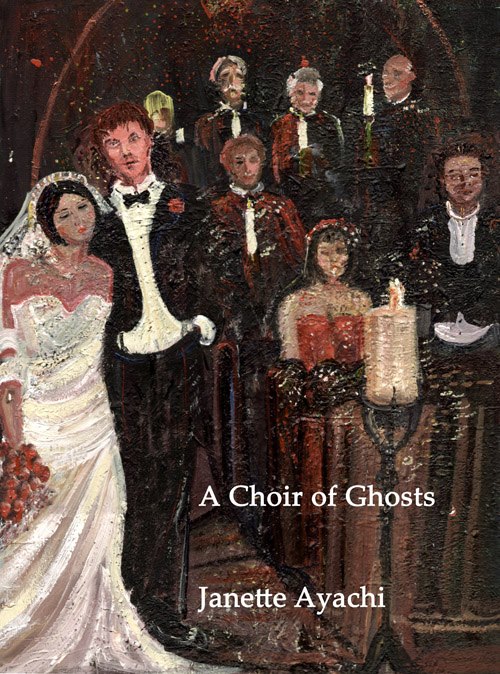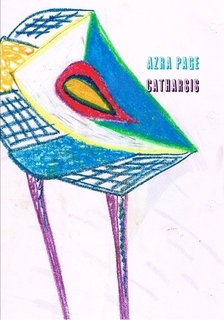A Choir of Ghosts by Janette Ayachi
-Reviewed by Hayden Westfield-Bell–
Janette Ayachi’s A Choir of Ghosts, published by Calder Wood Press, navigates prostitution, love, loss, death, myth and magic in a historically informed series of poems that tickle the nose, whisper in the ears and entertain the eye.
From Amsterdam to Berlin, ‘Livorno to Leith’, Ayachi summons place masterfully, creating densely populated environments in short stanzas and placing the reader comfortably within her surrounds with sharply penned lines:
‘I imagine the Campbell sisters at Inverary Castle […] amongst the smirr
of wild ivy, flocks of garden geese, spending their spring
mornings tracing the scaffold of daffodils’(‘The Campbell Sisters’).
This is particularly well realised in ‘Squatter’s House (Besetztes Haus)’ where Ayachi, riffing off Gerhard Richter’s painting of the same name, imagines the house as self:
‘is it the gleam of cartilage twigs and mica-silver stems
or the way claret sunlight stops staccato
over the winter-white skinned poultice and stone’.
‘Rehab and the Red Sea’ also has a similarly well accomplished sense of place, throughout the poem Ayachi pins her reader with contained images that help to navigate the peregrinations of the narrator, from ‘the tongue of the canal in Amsterdam’ to ‘the hot-blooded stare of the red light’ and ‘inside’ where ‘the smell of perfume and bleach / it dips into the air sharp like formaldehyde’.
Unfortunately, Ayachi’s descriptive abilities can unknowingly compete with one-another in certain poems leading to internal tension and occasional knottiness. In ‘A Choir for Ghosts’ Ayachi perfectly realises the metaphor of a choir of ghosts as a bunch of flowers; ‘each face a flower framed by a nimbus of petals’ the ‘nimbus’ accurately navigating the ethereal, physical and delicate areas of the image, but later we find:
‘the night hymns of owls
serenade the mottled moon
the taste of mercury is in everything’
where the last line falls flat against the first and second – appearing vague and uncertain. This uneasiness in the lines causes infrequent hiccups in occasional poems (experienced in ‘Veins of Venice’ with the line ‘the rustle of notes merged with the rustle of bed-sheets’, or the use of ‘death hissing’ in ‘Luna al Limone’), where perhaps the movements could have been subtler.
‘Room in Glasgow’ is one of many robustpoems found in the chapbook; the incredibly strong opening further showcasing Ayachi’s ability to summon place from the specific:
‘umber drops of flowers,
apricot verbena, gaudy Arabian roses […] the city’s lunar basalt breath on my skin’
to the more supernatural:
‘light stutters and absence becomes void […] propped in the dip of dark […] trapped
in this room in Glasgow, in a cloud’.
The poem touches on fairytale elements with its clipped wings, routes ‘hedged with thorns’ and vast drops which grow to build a phantasmagorical landscape that represents the emotional turmoil of the poem’s protagonist. ‘Hessian Lungs’ is similarly effective; the body imagined through scientific, natural and urban imagery that, like the subject of the poem, heaves and balloons. The rhythm replicates this fleshy thickness as the stanzas ache with a mumbling vocabulary – pneumonic, analgesics, opiates, dimension, induced – that beats with the body. ‘Mothlight’ too is tightly penned and very imaginative, and I found the final stanza particularly rewarding with its
‘molecules and fibres
amber hues and fragmented fossils
microscopic and kaleidoscopic.’
The formatting of the text stutters a little at the bottom of ‘Rehab and the Red Sea’, and I found myself unsure of the spacing in the final of ‘The Ceramic Cemetery’ and couldn’t work out if this was purposeful or accidental. In ‘Clouds from Marseille to Annaba’ the final stanza could benefit with some shuffling and I found the spacing in the final line of ‘Squatter’s House’ ineffective and potentially a sly attempt by Ayachi to hide the length of that final line. These spaces are significant in ‘Lavender Gardens’ and are used imaginatively, dislodging sounds and shapes from the poem that invites interpretation and slows reading to create rhythm. ‘Lavender Gardens’ is a fantastic final poem to the collection and investigates the core themes raised by previous poems; meditating on place and its relation with history, summoning up vivid images that blend in with the spiritual.
As a whole, A Choir of Ghosts is a powerfully imaginative collection of poems that tempts and teases the readers’ imagination, taking them by the hand and leading them through fantastic, wild environments that throb with emotional and personal histories. Ayachi identifies the magic of the everyday and refines these observations into crystal-like poems that, though tarnished by minor impurities, glint and sparkle through the eye of the reader.




